Xmal Deutschland were a band that never came close to receiving the credit that they were due. They were a band that would who came to life in 1981, immediately pigeonholed as part of the “Neue Deutsche Welle” (New German Wave) movement along with the likes of Einsturzende Neubauten, DAF, Joachim Witt, and many, many others. Once signing to 4AD brought them to underground prominence, Xmal Deutschland then suffered from endless comparisons to Siouxsie and the Banshees, once again erroneously classified. However, in actuality, Xmal Deutschland was an amazing post-punk band with a strong singer and a unique sound all their own. Artist Anja Huwe, singer of the band, gives us some insight into the origins of Xmal Deutschland, their time with 4AD and their imminent departure and demise, and glimpses into her life after recording and her new stint as an artist.
As a girl in her teens, Anja would make various trips to London with her boyfriend to check out the burgeoning ’77 Punk scene. At the time, she had sights on Paris to pursue a modeling career (Anja had very long hair prior to this, but cropped it to become a hair model), but heavily influenced by the DIY punk aesthetic, she soon formed the original all-female incarnation of Xmal Deutschland with the assistance of borrowed equipment from various friends and boyfriends.
“It all started in 1980 because our friends were in punk bands.”
In those early days, Anja would even spend time sharing a flat in Germany with a crowd that included members of Einsturzende Neubauten and the notorious Christiane F., each seeking their own musical relevance at the time. Anja originally began as the band’s bass player, but soon switched to vocals by default.
In The Beginning: To a fledgling band in Germany, Alfred Hilsberg’s ZickZack label was a godsend.
“Alfred was great, he would release anything”.
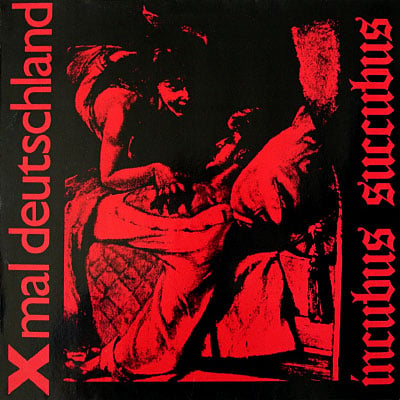
The first Xmal recordings, the 1981 Großstadtindianer 7’’and 1982’s seminal 12″ Incubus Succubus were released with little fanfare in their native Germany, but garnered much more interest in England via the legendary John Peel , who over the years recorded four of his famous Peel Sessions with the band. Consistently gigging in London, Xmal Deutschland grew their fan base while touring with bands such as The Mission, The Cult, and Cocteau Twins, the latter who helped the band obtain a spot on 4AD.
1983’s Fetisch captured that pure, raw energy that any great first album should. Musically tight and lyrically dark, Fetisch was an incredible debut album which put the band light years beyond anything in the Neue Deutsche Welle realm. Classic tracks like ‘Qual,’ ‘Geheimnis,’ ‘Danthem,’ and the album’s strongest track ‘Boomerang,’ clearly showed Xmal Deutschland at their finest. Xmal worked on the album with John Fryer, in the studio owned by Vince Clarke.
“We would record during the daytime while at night was Depeche Mode’s time. To sing every morning, we would have to put away all these walls because Dave Gahan couldn’t sing in front of people.”
Also in 1983, the band re-recorded ‘Incubus Succubus’ at the urging of label head Ivo Watts-Russell, which birthed the version that is still, to this day, a dance floor staple in every goth/industrial club around the world.
Released in 1984, The band’s second record, Tocsin refined the energy of the debut album and as any good sophomore album should, it broadened their sound; adding more atmosphere and richer production, most notably on tracks such as ‘Reigen,’ ‘Eiland,’ ‘Tag Fur Tag,’ and ‘Xmas in Australia.’
”Ivo (from 4AD) liked the first album. Disappointingly, however, he wanted us to be the new Wire. We wrote songs that meant something to us, but that’s just what he didn’t want us to do- he wanted us to be arty.”
Anja and co. strongly disagreed with Ivo’s suggestions, so the band parted ways with 4AD upon the record’s release and took things upon themselves. As the band’s following grew and grew, singing comparisons to Siouxsie Sioux arose, but funnily enough when asked, her response was most curious.
“I never heard her music, and I just didn’t know her. We nearly had the same management at one point (Dave Woods), but the Banshees said NO, you’re not going to manage THEM.”
Hot off the heels of their 4AD departure, Xmal Deutschland decided to start their own label, X-ile. Their releases were set to be distributed through the German Phonogram label, who promised worldwide distribution as well. However, the truth was that 1987’s Viva didn’t nearly have the impact that it could and should have, for despite decent sales in Canada and England, it was still a very-hard-to-find record in the US market.
Viva, though perhaps an album largely unheard, may be in fact Xmal’s finest hour, containing numerous great tracks like ‘Matador’ (produced by friend Hugh Cornwell of The Stranglers), ‘Eisengrau,’ ‘Sickle Moon,’ ‘Polarlicht.’ and ‘Morning (Will There Really Be),’ which was based on an Emily Dickinson poem. To this day, the CD pressing still sells for around $100, if you can catch one on various online auction sites. As a taste of things to come, some of Anja’s earliest artwork can be seen in the booklet that came with the Limited Edition Matador 12’’. (NOTE: buy this if you can EVER find it!)
Even during their finest recording hour, more and more label tensions plagued the band.
“We had this attitude, we could have been much bigger, and we had the same manager as Simple Minds! He got us a deal with Island Records. We were ready to sign, but Xmal Deutschland was a band that said we would always sing in German and never ever in English and that was it. With Phonogram it was the same sort of problem.
Phonogram signed the Mission UK and All About Eve around the same time and they were successful. Since Xmal Deutschland was not as successful Xmal wasn’t really pushed.”
Anja also tells of the numerous attempts to push her to the forefront of the group. Sugarcubes vocalist Bjork had been nudged to go solo by the same publishers that were pushing Anja to do the same, further straining relations in Xmal Deutschland.
“Phonogram said ‘we want you as the main person’ but I said ‘I’m the singer, I’m just part of the band. Without the band I’m no one.’”
Signing with Metronome Musik in Germany for their next record Devils in 1989, the band was again promised worldwide distribution but yet again, the only licensing outside Germany was to the Attic label in Canada. Devils was the only Xmal album sung entirely in English.
“I just made the decision to give it a go and try it, which was good because it was totally different to sing in English. The songs were really great songs, really hard songs. Warner wanted to sign us first but they said this was nearly heavy metal. We said we wanted the album out at the same time in Britain, America, etc. and they just fucked it up. It just came out in Canada- it didn’t even come out in Britain!”
Soon after the record’s release, Xmal Deutschland would call it quits.
After Xmal: In the mid to late 90s, Anja grew interested in the techno/trance scene. She worked for the internationally broadcast German music station VIVA TV where she hosted the show “HouseFrau,” a one-hour TV show with videoclips, electronic musicians, djs, reports on rave events and information about techno/trance labels. In viewing her present-day artwork you can clearly see that the bright colors and liveliness of the techno scene are part of her influence.
After a life threatening illness in the late 90s caused Anja to spend nearly a year in a hospital, she recovered and went back to her television work. This time the daily stresses of a crazed schedule and the death of her father brought her to consider a lifestyle change. Though it was something she had merely flirted with in the past, she started painting again.
“I realized that for me, this is my kind of music, because I was totally satisfied with working with colors. The whole thing that we were in, like the punk thing, we never wanted to be pop stars- we were all artists. We never wanted to be the focus, we did what we did.
When I started making music, I also started studying art but I had to make a decision and being in a band was more fun so that’s why I stopped studying.”
After all her years in the music business, Anja threw herself full time into her art. The beautifully colored and painstakingly precise paintings that she has created simply jump off the image. Her typical canvas is covered in a complete field of uniform dots, which allows her works to look and feel three dimensional.
“I paint music. I hear color. My work is the synesthetic translation of sounds and tones. My paintings can be heard with the eyes. Many times, performing with Xmal Deutschland, I would remember songs as colors. This is the Blue song, this is the Red song…”
Each of her paintings could virtually compare to a song; imagine them measured as a frequency response using EQ as if they’re moving, depending on which angle the viewer takes. Her pieces are all untitled, leaving each open interpretation (again just like a song), as to the feel and flow of the color combinations. Each viewer and viewing creates a different effect. Listen To The Pictures indeed…
Anja Huwe has had exhibitions in Germany, London, and New York. She continues to paint and splits her time between Hamburg and New York with frequent trips to London. You can view many pieces of Anja’s artwork at www.anjahuwe.com.
This article is dedicated to my late best friend Stephen Cundaro, without whom many a great band would have gone undiscovered. You are missed but your spirit will never die.

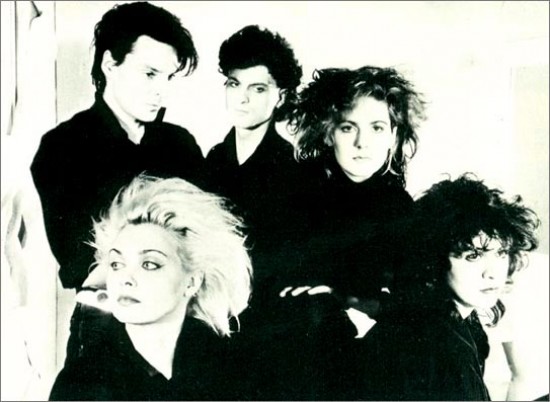

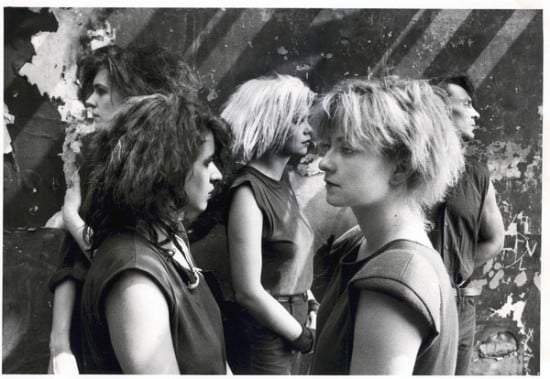
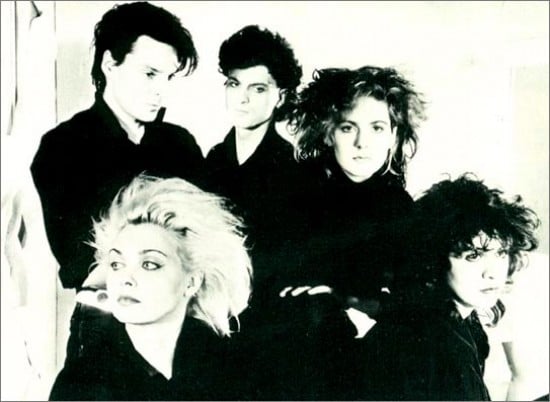
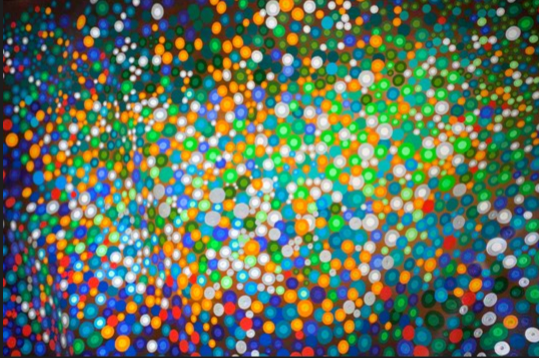






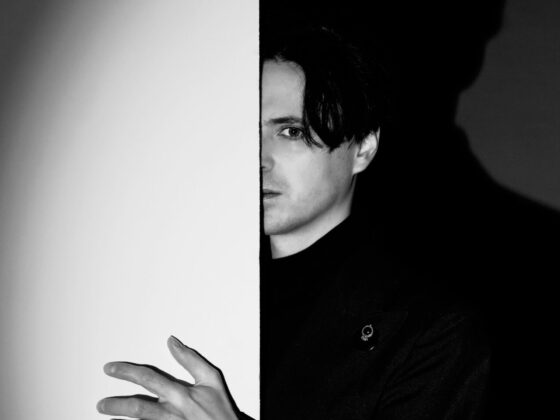


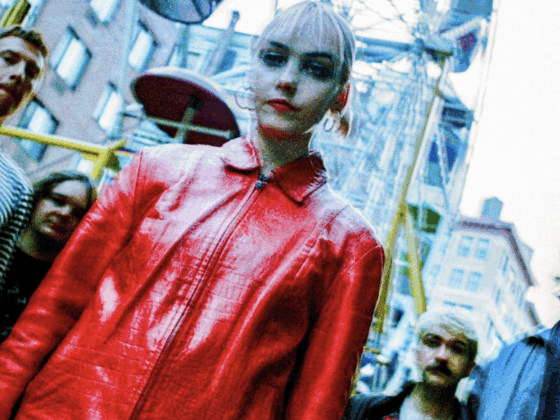
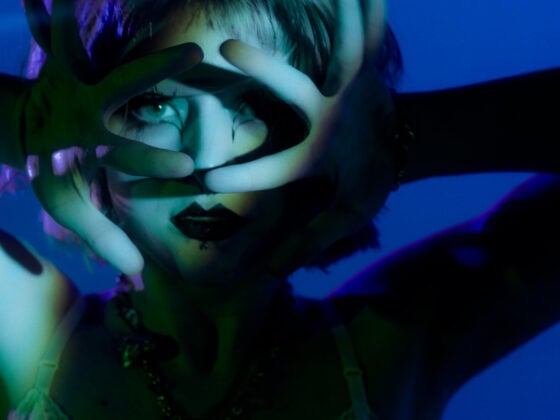

 Or via:
Or via: